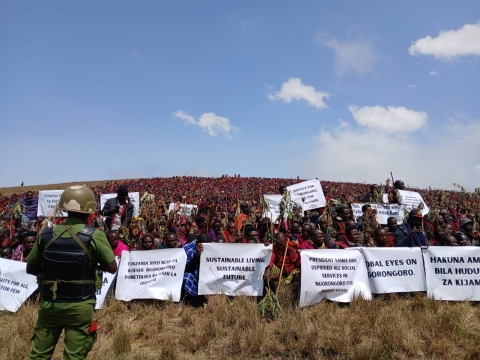
Tens of thousands of Maasai People living in the Ngorongoro Conservation Area in northern Tanzania joined a five-day protest in August, forcing President Samia Suluhu Hassan to acknowledge their demands to restore essential social services and the right to vote.
The following article was published in the September-October 2024 issue of NewsNotes.
For more than two years, over 100,000 Maasai People, mostly pastoralists, have been living under the threat of forced eviction from a 1,500-square kilometer section of the Ngorongoro Conservation Area in northern Tanzania that was recategorized in 2022 as a game reserve. Under that redesignation, cattle grazing and human settlement is prohibited and wildlife habitat preservation, safari tourism, and designated hunting activities will be permitted. Since then, Tanzanian officials have been implementing a gradual effort to evict, relocate, and resettle the Maasai by confiscating cattle, seizing grazing land, assaulting residents, and cutting off essential social services.
A Human Rights Watch report said that “government-employed rangers assaulted and beat residents with impunity,” with community members reporting 13 alleged incidents of beatings between September 2022 and July 2023. The most egregious police violence occurred in mid-2022 when security forces and Maasai clashed in the town of Loliondo during a land-demarcation exercise, which restricted access to grazing sites, water sources, and some homes. The incident reportedly resulted in gunshot injuries to 32 protesters and the arrest on murder charges of 24 local Maasai, including 10 local leaders–charges that were dropped when it became apparent that the accused had been detained prior to the murders.
More recently, the cover story for the May 2024 issue of The Atlantic describes park rangers burning Maasai compounds and seizing cattle by the tens of thousands. New maps and proposals from the government indicate that further tracts could soon be confiscated for tourism and conservation, including a sacred site that the Maasai call the Mountain of God. “This is 80 percent of our land,” a Maasai elder told the reporter from The Atlantic. “This will finish us.”
The Maryknoll Office for Global Concerns is a member of a global advocacy group called the Maasai International Solidarity Alliance (MISA) that works with Catholic Church officials and Maasai community leaders to protect Maasai land rights and promote their human dignity. Together, we have appealed to the United Nations, the European Union, the East African Court of Justice, and Vice President Kamala Harris when she visited Tanzania in 2023. We have written to U.S. tennis star John McEnroe after hearing that he was hosting a $25,000-a-person safari-and-tennis expedition in the Serengeti. We received some polite responses but no concrete actions.
The situation came to a head in August after the Tanzanian government published a revised national voter register that did not include the Ngorongoro division, denying over 100,000 Maasai pastoralists their right to hold local elections and participate in next year’s general elections. The move provoked criticism from human rights activists, describing it as part of a broader strategy to expel the ethnic group from their ancestral land.
On August 18, the Maasai community in Ngorongoro organized a major peaceful protest along the Ngorongoro-Serengeti highway, blocking safari vehicles filled with tourists and demanding the government uphold their fundamental rights. Speaking before the thousands of Maasai standing in the road and sitting on the hillsides, community leaders called for meaningful dialogue with Tanzanian authorities to address their grievances and urged the public to support their fight for justice.
After five days of protest, the minister of State in the Prime Minister’s Office responsible for Policy, Parliamentary Affairs and Coordination, William Lukuvi, addressed the crowd on Aug. 23, saying President Samia Suluhu Hassan sent him to instruct local and regional authorities to reinstate social services, mainly education, health and water services. He also said the president plans to meet with representatives of Ngorongoro residents and arrangements will be made for them to address their grievances to her directly.
About elections, Minister Lukuvi said the president has ordered that local elections, scheduled to be held nationwide on Nov. 27, are to be held in Ngorongoro.
The president of the Tanzania Episcopal Conference (TEC), Bishop Wolfgang Pisa, spoke extensively about the injustices facing the Maasai on Aug. 25 during the Silver jubilee celebration of priesthood for the Bishop of Mbulu Diocese, located approximately 90km south of the Ngorongoro Conservation Area, saying, “There is no truth that the people are moving voluntarily, but they are being forced out and they are raising their voices about the denial of their rights... good governance is a legitimate way to be responsible and good governance comes from the people themselves... The government should sit at the same table with the people of Ngorongoro; don’t force them to move.” Bishop Pisa’s remarks were received with much applause from the congregation present.
Photo of protesters amassing by the thousands on day of action in Tanzania, courtesy of the Maasai International Solidarity Alliance.
